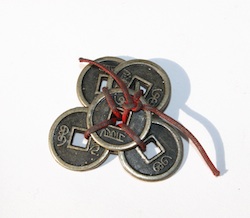
Deemed the world’s most vertical city, Hong Kong is an international finance centre that is as famous for its contemporary architecture as it is for its capitalist economy. Lack of space has created the need for its intense development, yet for all the city's outwardly modern appearance, very few (if any) of Hong Kong’s commercial or residential properties would have been constructed without recourse to the ancient Chinese disclipine of Feng Shui. So strong is the belief in this environmentally based system, that at least 90 per cent of companies in Hong Kong employ a Feng Shui consultant on a regular basis
Literally translated as “wind and water”, Feng Shui’s origins date back several thousand years to the start of Chinese civilisation when it was used to select suitable locations for new villages, as well as for burial sites. It is a complex system that uses psychological , geographical, mathematical and aesthetic rules to control the flow of engergy or chi in a building or a room, so that it is in harmony with the environment. This in turn benefits the lives of the people who live or work that property.
The principles of Feng Shui are founded on traditional Chinese medicine, which is based on the dynamic opposites of yin and yang, together with the five elements (water, wood, fire, earth and metal) as well as form, landscape, space orientation and time. It is about creating a natural equilibrium, while promoting health, harmony, stability and prosperity.

A number of major corporations and business leaders have been cited as using Feng Shui as a business tool to increase their potential and protect their assets. Although not all of them claim to fully understand its principles. Donald Trump has been famously quoted as saying: “You don’t have to believe in Feng Shui for it to work. I just know it brings me money.” Apparently he became interested in the subject when he lost a contract to clients who didn’t like the Feng Shui of a building.
The chairman of Microsoft, Bill Gates, is a Feng Shui devotee, as is reputedly Virgin boss Richard Branson. Coca Cola used Feng Shui at its headquarters in Atlanta to increase productivity and before Hong Kong Disneyland opened in 2005, a Feng Shui master was employed to ensure the park’s success. When McDonalds’ replaced their garish yellow and red plastic with leather seats, earth tones, plants and trickling water, they were following Feng Shui principles.
Despite such high profile examples, Feng Shui is noticeably less popular in Europe, compared to Australia, Canada and the US, which is probably due to there being fewer Asian immigrants in Europe and therefore less familiarity with Asian culture. However, it pays to keep an open mind, as property entrepreneur Declan Curran, the founder of HomeFix Direct discovered when he was asked by a client to Feng Shui an office...
“The boss of a large stationery supply company in East London hired us to refurbish their office spaces and call centres, but on the condition that we did so along Feng Shui principles. I knew a bit about chi as I had practised Kung Fu when I was a boy, but I must admit I was rather sceptical about this project. However, I quickly educated myself on the essential elements before delivering a proposal and layout plan, which won the job.
“We altered the public access areas to reflect the importance of ‘the mouth of chi of the building’ for a business, integrated some flowing water features, created work zones in certain areas that were more conducive for productivity and a few other little Feng Shui staples that fitted the bill.
And the client? Oh the business went bust and the building burned down two months later. Just kidding. They’re still doing great.”
Hospitals in the West were among the first to recognise the benefits of Feng Shui by applying its principles to the classic long, straight, narrow hallways, which make energy accelerate and causes stress. Now many hospitals break up these straight lines by wider corridors, plants and by hanging paintings to create soothing energy.

Feng Shui has many concepts that can be applied successfully to the purchase or building of commercial premises. For example it is possible to identify sites that have the potential to prosper or to fail. Favourable sites including a south-facing, gentle slope with an open space in front. Steep slopes are not auspicious because the energy flows aways. The same applies to flat land, which lacks diversity. A windy site is also to be avoided as a strong breeze can scatter chi. Property located near water is ideal, particularly if it is running water, which is good for creating energy, although a curved river is preferable to a straight stretch.
The size and shape of a building can effect its Feng Shui, too. There are five basic shapes, which are associated with the elements:
Tim Cole, a project manager for Savills once undertook some services for a private bank in the City. “The flow of the office space was particularly important to the client and was therefore a major consideration for the designers in terms of the layout of the office space and banking area. The client was consulted regarding requirements and specific considerations concerning Feng Shui and this was factored into the overall design to ensure requirements were met.
Specific issues presented during the project included:
The ideal location for good Feng Shui contains both mountains and water, with a higher ground at the back (called the Black Turtle), to provide protection and support. Which explains why a tiny city like Hong Kong, sandwiched between mountains and sea, has developed into a world class financial centre.
About the author
Richenda Oldham is the editor of Property News and a freelance journalist and copywriter.
Have you any commercial property events you'd like to tell us about? It could be networking, exhibitions, seminars, industry lunches or sporting fixtures. We will list them for free. Just email newsdesk@propnews.co.uk with the following details: Event name, date, time, venue, cost, booking info and a brief description of the event.
To list your property job vacancies on Property News. Email: richenda@propnews.co.uk.